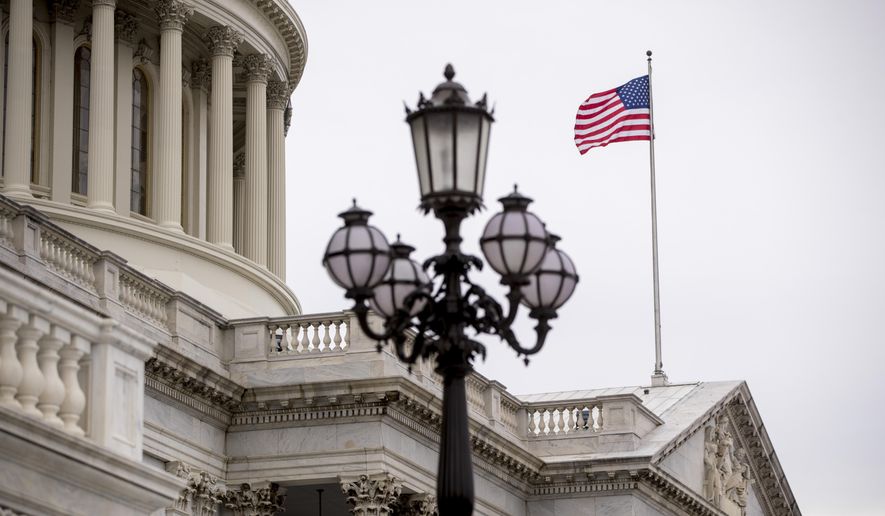The Trump administration is moving ahead with plans to relocate federal agencies with hundreds of employees to flyover country, but they won’t be leaving the swamp without a fight.
Del. Eleanor Holmes Norton, D.C. Democrat, announced this week legislation requiring all positions currently located in the National Capital Region to remain there, accusing the Trump administration of attempting to “sabotage” the Bureau of Land Management.
Under the relocation plans, about 300 BLM staffers would be scattered across the Western states. Two Department of Agriculture agencies, the Economic Research Service and the National Institute of Food and Agriculture, have already started moving to temporary offices in the Kansas City area.
“Congress cannot do its work to write laws without the unvarnished facts that nonpartisan agencies give,” Ms. Norton said in a statement. “Staff losses at BLM and USDA will directly hurt public lands, small-town farmers, and our agriculture policy, not to mention impact hundreds of federal employees and their families.”
The administration has argued that the moves will ultimately save millions by settling workers outside the pricey Beltway area while bringing them closer to the Americans they serve, especially in the case of the BLM, which manages public lands found almost entirely in the West.
Funding for the moves is already on the books for Fiscal 2019, but Fiscal 2020 is another question. Ms. Norton said she was able to insert provisions in the Fiscal 2020 House spending bills “to block USDA from moving to Kansas City.”
“Just as I did with USDA, I will continue to fight these misguided, politically motivated relocation efforts at the BLM,” she said.
Ms. Norton isn’t alone. Decrying the relocations are unions, advocacy groups and former Interior officials, including former BLM director Robert V. Abbey, who served from 2009 to 2012 under President Obama, and Obama administration Interior Deputy Secretary David J. Hayes.
“I think the endgame is to try to make it almost impossible to manage these public lands,” Mr. Abbey told Bloomberg news agency.
“It’s just another step that they are taking that will add credence to those advocates that say these lands should be managed by the states,” he charged.
Foes of the BLM move have argued that about 95% of BLM employees are already located in the field, while Interior Assistant Secretary Joseph Balash said that only about half of the senior personnel are stationed in the West.
In a Monday letter, the Public Lands Foundation, which represents about 600 former BLM employees, told the Senate Energy and Natural Resources Committee that sending 80% of the agency’s professional staff to the West would result in a “weak and ineffective management structure.”
Others have predicted that the agencies will suffer a “brain drain” as federal staffers quit rather than relocate, a scenario already playing out at the USDA.
At the Economic Research Service, 72 employees have agreed to move to the Kansas City area and 99 have declined. The National Institute of Food and Agriculture reports 73 accepting and 151 declining. Remaining in the Beltway will be 76 ERS positions and 21 NIFA slots.
“We expect these numbers may fluctuate until September 30, the report date to the Kansas City region for relocating employees, as employees are free to change their status until that date,” said the USDA in a statement.
“These anticipated ranges were taken into account in the Department’s long-term strategy, which includes both efforts to ensure separating employees have the resources they need as well as efforts to implement an aggressive hiring strategy to maintain the continuity of ERS and NIFA’s work,” the department said.
Outside the Beltway, however, the administration’s attempt to decentralize the federal government has met with cheers.
Kansas Gov. Laura Kelly and Missouri Gov. Mike Parson have praised the USDA move, calling it a win-win for the two states that share the Kansas City metro area.
“We offered an ideal location for the USDA operations,” said Ms. Kelly, a Democrat, in a statement. “The new facilities will be strategically located close to a top agricultural research institution in Kansas State University. The quality of life we offer also was a strong consideration and selling point.”
Colorado Gov. Jared Polis, also a Democrat, said he was “thrilled” to welcome the BLM workers. His state is slated to receive the BLM headquarters, which will bring the director and 27 positions to Grand Junction, Colorado, near the Utah state line.
Mesa County Commissioner Rose Pugliese said she’s already received an email from a BLM employee who said he hopes to be part of the Grand Junction contingent.
“This is a great place to live, and I think they’ll see that once they get here,” Ms. Pugliese said.
• Valerie Richardson can be reached at vrichardson@washingtontimes.com.




Please read our comment policy before commenting.